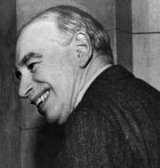
, as well as the economic policies of governments. He greatly refined earlier work on the causes of business cycle
s, and advocated the use of fiscal
and monetary measures to mitigate the adverse effects of economic recession
s and depressions
.
I work for a Government I despise for ends I think criminal.![]()
In truth, the gold standard is already a barbarous relic.![]()
If economists could manage to get themselves thought of as humble, competent people on a level with dentists, that would be splendid.![]()
Most men love money and security more, and creation and construction less, as they get older.![]()
Words ought to be a little wild, for they are the assault of thoughts on the unthinking.![]()
His peculiar gift was the power of holding continuously in his mind a purely mental problem until he had seen it through.![]()

